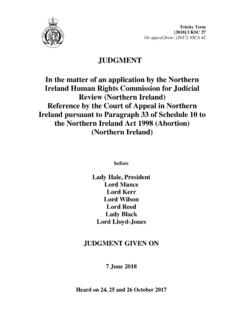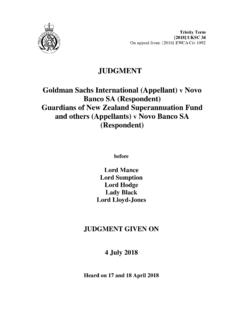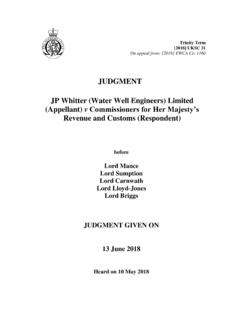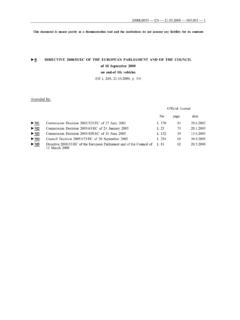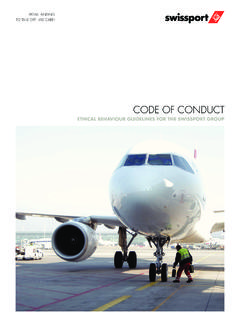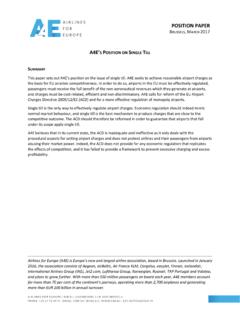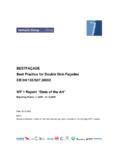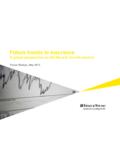Transcription of British Telecommunications Plc (Appellant) v …
1 Trinity Term [2014] UKSC 42 On appeal from: [2012] EWCA Civ 1002 JUDGMENT British Telecommunications Plc ( appellant ) v telef nica O2 UK Ltd and Others (Respondents) before Lord Neuberger, President Lord Mance Lord Sumption Lord Toulson Lord Hodge JUDGMENT GIVEN ON 9 July 2014 Heard on 3 and 4 February 2014 appellant Daniel Beard QC 1st Respondent (Telefonica O2 UK Ltd) Sarah Lee Ligia Osepciu (Instructed by BT Legal) Jonathan Crow QC Robert O Donoghue (Instructed by King & Wood Mallesons LLP) Interested Party (Office of Communications)
2 Javan Herberg QC Mark Vinall (Instructed by Ofcom) Intervener (Gamma Telecom Holdings Ltd) Sarah Love (Instructed by Charles Russell LLP) 2nd, 3rd and 4th Respondents (EE Ltd, Vodaphone Ltd and Hutchison 3G UK Ltd) Jon Turner QC Philip Woolfe (Instructed by EE Limited, Herbert Smith Freehills LLP; Constantine Cannon LLP) LORD SUMPTION (with whom Lord Neuberger, Lord Mance, Lord Toulson and Lord Hodge agree) Introduction 1. These appeals arise out of a dispute between British Telecommunications Plc, whom I shall call BT , and four mobile network operators.
3 The dispute is about the termination charges which BT is entitled to charge to mobile network operators for putting calls from the latter s networks through to BT fixed lines with associated 08 numbers. The dispute is a highly technical one, both factually and legally, and like most such disputes involves a surfeit of acronyms. But it raises issues of great importance to the Telecommunications industry, to its regulator, and indirectly to millions of consumers. 2. The following summary is a gross over-simplification but is sufficient for present purposes.
4 In principle, the cost of a call is charged to the caller by the originating communications provider to which he subscribes (a CP , in the jargon of the business). Out of its charges to the caller, the originating CP must pay charges to the terminating network or to an intermediate carrier if there is one. 08 numbers are known as non-geographic numbers. They are allocated to fixed line subscribers, and automatically translated into the appropriate geographic number in the course of transmission. Where the call originates from another fixed line, an 08 number allows the subscriber to whom that number has been allocated to receive it on the basis that the caller will be charged at a standard, and generally reduced, charge.
5 Calls to 080 numbers are free to fixed line callers except where charges are notified at the beginning of the call. Calls to 0845 numbers are charged to fixed line callers by the originating CP at its standard local call rate. Calls to 0870 numbers are charged to fixed line callers by the originating CP at its standard national call rate except where different charges have been published. In each case, the terminating CP will collect a termination charge from the CP from which it received the call. However, where calls originate from a mobile network operator, that operator will commonly charge the caller for a call to a 080 number, or charge him more than the standard local or national rate for a call to a 0845 or 0870 number.
6 3. In 2009 BT notified mobile network operators of a revised scheme of termination charges for 08 numbers. The defining feature of the new scheme was that mobile network operators would be charged at a rate which varied according to the amount which the originating network charged the caller. The higher the charges to the caller, the greater the termination charge. The new scheme was rejected by the four mobile network operators party to these appeals. The issue was submitted Page 2 to the Office of Communications (Ofcom) under a statutory dispute resolution procedure.
7 Appeal lies from Ofcom to the Competition Appeal Tribunal, and from them on points of law only to the Court of Appeal. Ofcom decided that BT should not be allowed to introduce the new charging scheme. The Competition Appeal Tribunal overturned that decision and decided that they should. The Court of Appeal restored the original decision of Ofcom. The legal framework 4. The sector is regulated under a pan-European regulatory scheme known as the Common Regulatory Framework. The objective of the scheme is to ensure end-to-end connectivity on a common basis throughout the EU, without distortions arising from anti-competitive behaviour or restrictions arising from national law or practices.
8 It is contained in a number of Directives, all issued on 7 March 2002. Two of these are important for present purposes. They are Directive 2002/21/EC, known as the Framework Directive and Directive 2002/19/EC known as the Access Directive. They were amended in 2009, with a deadline for transposition in 2011, after the time which is relevant for the present appeal. I shall refer to them below in their unamended form. They refer to each other, and have to be construed together. The Directives 5. The background to the Directives, and previous Directives on the same subject, is the progressive liberalisation of the European Telecommunications market which had previously been dominated by state-controlled monopolies.
9 The Framework Directive recites, at Recital (1), that the current regulatory framework under previous Directives has been successful in creating the conditions for effective competition in the Telecommunications sector during the transition from monopoly to full competition. Recital (25) records that it may still be necessary to impose ex ante obligations on CPs to ensure the development of a competitive market, where CPs exceed a given threshold of market power, but that the relevant threshold should now correspond to the concept of dominance as defined in the case-law of the Court of Justice, the possession of significant power enabling a CP to operate unconstrained by competitive pressure.
10 Recital (27) recites: (27) It is essential that ex ante regulatory obligations should only be imposed where there is not effective competition, in markets where there are one or more undertakings with significant market power, and where national and Community competition law remedies are not sufficient to address the problem. Page 3 Subject to ex ante regulation in circumstances where there is not effective competition, the scheme of the Directives is permissive. The Access Directive recites: (5) In an open and competitive market, there should be no restrictions that prevent undertakings from negotiating access and interconnection arrangements between themselves, in particular on cross-border agreements, subject to the competition rules of the Treaty.
